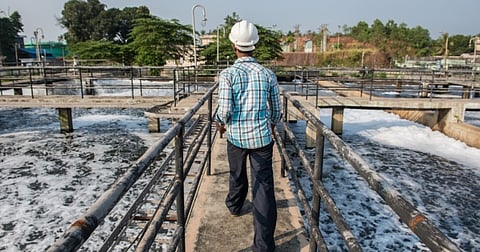Adopt Covid-19 precautions: CPCB to sewage water treatment plants
The Central Pollution Control Board (CPCB) has asked sewage water treatment plants to ensure adopting all covid-19 precautions for its workers to protect them from SARS CoV2 infection as virus found in sewage water may be a source of transmission of disease.
Taking cognisance of various studies conducted across India wherein viral RNA of SARS CoV2 was found in sewage water, the CPCB is planning to convene a meeting next week to review covid-19 related guidelines for workers in the sewage treatment plants.
“We are already conducting surveillance of SARS CoV2 virus in biomedical waste and wastewater. We have recently observed that viral RNA is found in sewage water and there is a high possibility in biomedical waste too. However, currently there is no evidence that virus transmission occurs through sewage, but if that is, which we still may not know, the workers in the sewage treatment plants may be highly susceptible to the infection, we have asked the sewage treatment plants to provide all preventive gear to the workers ranging from Personal Protective Equipment (PPE) kits, coveralls, gloves and face shields to protect them from covid-19," said T. K. Joshi, member, Central Pollution Control Board (CPCB) task force on air pollution and health.
“We have already issued guidelines in this regard and we will review if the sewage treatment plants are adhering to these or not, especially, those plants which are in high covid-19 burden areas," Joshi said.
The Indian Council of Medical Research (ICMR) recently found viral RNA of the SARS-CoV-2 virus in sewage samples from Mumbai, the worst affected Indian state by covid-19 pandemic.
Under a study done by ICMR’s National Institute of Virology, Mumbai Unit and Division of Epidemiology & Communicable Diseases, New Delhi, a total of 20 sewage samples collected from six different wards in Mumbai city during May 11-22, 2020. Real-time reverse transcription-polymerase chain reaction (RT-PCR) assay was used to detect the presence of SARS-CoV-2 RNA.
Viral RNA was detected in sewage samples collected during the ongoing covid-19 pandemic in all the six wards, the authors said.
The study also published in the Indian Journal of Medical Research this week has said that SARS-CoV-2 detection in waste waters could be used to understand the epidemiology of covid-19. For example, decreasing concentration or absence of virus at previously SARS-CoV-2-positive sewage sampling sites may indicate successful implementation of covid-19 control strategies, and also it may provide evidence of the presence or absence of SARS-CoV-2-infected populations and confirmation of covid-19-free zones.
Though SARS-CoV-2 spreads mainly via the droplets of respiratory secretions, it was also detected in stool samples of patients, indicating active infection of the gastrointestinal tract, the study has highlighted. Presence of SARS-CoV-2 RNA in sewage samples was reported in February 2020, raising the possibility of using environmental water surveillance to monitor SARS-CoV-2 activity in infected areas.
Mint in August 2020 reported that after World Health Organization (WHO) recommended environmental surveillance of SARS-CoV-2 virus causing covid-19 in wastewater following presence of non-infecting viral fragments in wastewater in some countries including Pakistan, India too is considering to adopt the new surveillance tool to monitor the Virus.
The Central Pollution Control Board (CPCB) under ministry of environment has already been issuing revised guidelines for disposal of human waste including fecal waste generating from the covid dedicated hospitals and quarantine centres that the waste should be properly treated before disposal.
The WHO in its scientific brief issued last year titled-- Status of environmental surveillance for SARS-CoV-2 virus—stated that detection of non-infective RNA fragments of SARS-CoV-2 in untreated wastewater and or sludge has been reported in a number of settings, such as Milan, Italy; Murcia, Spain; Brisbane, Australia; multiple locations in the Netherlands; New Haven, Connecticut and eastern Massachusetts, United States of America; Paris, France; and existing poliovirus surveillance sites across Pakistan.
Disclaimer: This story has not been edited by Water Today staff and is generated from news feeds. Source: Mint

